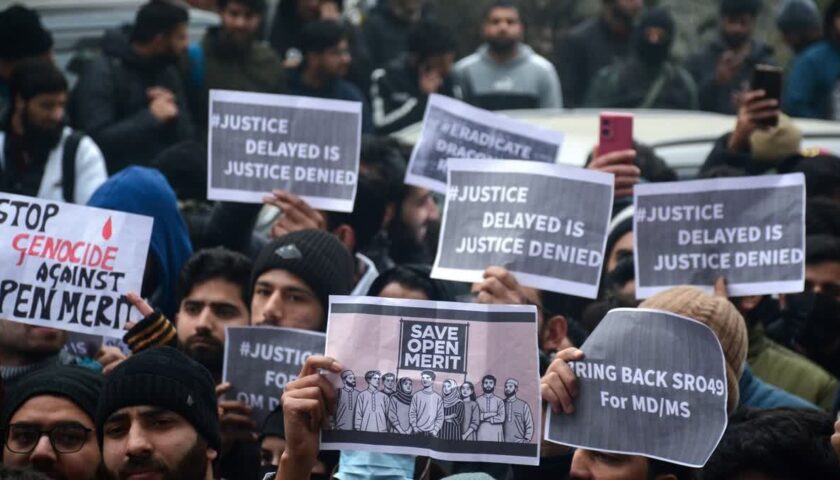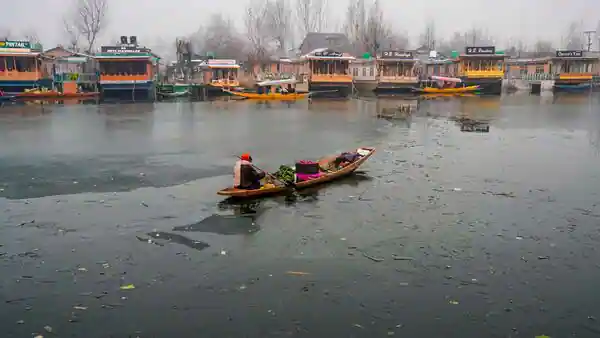The Congress, which contested the polls in alliance with the National Conference, chose not to take a ministerial position.
The Omar Abdullah-led government in the union territory of Jammu and Kashmir has five cabinet ministers, including four from the National Conference and one independent MLA.
The Congress, which contested the polls in alliance with the National Conference, chose not to take a ministerial position.
The ministers in the Omar Abdullah-led cabinet include the only woman minister, Sakina Itoo, as well as Surinder Choudhary, Javed Rana, Javed Ahmed Dar, and Satish Sharma, who took their oaths alongside him on Wednesday at the Sher-e-Kashmir International Convention Centre (SKICC) in Srinagar.
The new government has represented all three regions of Kashmir—South, Central, and North—with Omar Abdullah as chief minister elected from Ganderbal and two additional ministers, while the Jammu division is represented by three ministers.
Meet the ministers in Omar’s cabinet in J&K
Sakina Itoo
Senior leader of the National Conference, Sakina Itoo secured victory from the DH Pora assembly segment in South Kashmir’s Kulgam district.
She was polled 36,623 votes, achieving an impressive victory margin of 17,449 votes over her nearest rival, Gulzar Ahmed Dar of the Peoples Democratic Party.
With a rich portfolio, she has served as the minister in the past for various departments including social welfare, administrative reforms, education and tourism.
She was 26 years old when she won her first assembly election in 1996, making her the youngest member of the Jammu and Kashmir Legislative Assembly.
Surinder Choudhary
A former member of the Legislative Council, Choudhary has been elected from the Nowshera constituency in the Jammu region in the recently concluded assembly election. He took oath as deputy minister in the new government. Choudhary defeated Ravinder Raina, the BJP president of Jammu and Kashmir, by over 7,000 votes.
Choudhary was previously associated with the Peoples Democratic Party (PDP) and left it in March 2022 to join the Bharatiya Janata Party (BJP). However, he exited the BJP in July 2023 and joined the National Conference (NC).
Javed Rana
Elected from the Mendhar assembly segment, reserved for Scheduled Tribes, Javed Ahmed Rana has previously served as a member of both the Legislative Assembly and Legislative Council in Jammu and Kashmir before it became a Union Territory.
In the recently held polls, he secured 32,176 votes, nearly 14,000 more than the BJP’s Murtaza Ahmed Khan, who finished in second place.
Rana hails from Kalaban village in the border district of Poonch. He completed his Bachelor of Arts degree and then studied law at the University of Jammu, graduating in 1989.
Satish Sharma
Elected from Chammb constituency of Jammu region as an independent candidate, Sharma defeated Bharatiya Janata Party (BJP) leader Rajeev Sharma by 6,929 votes.
Before the government formation, Sharma extended support to the National Conference-Congress alliance. Satish Sharma, son of the late former Lok Sabha MP Madan Lal Sharma contested as an independent candidate after Congress denied him a ticket from Chhamb.
His father was a senior Congress leader, who was elected from Jammu-Poonch Lok Sabha seat twice.
Javed Ahmed Dar
A senior member of the National Conference, Dar previously served as a minister under Chief Minister Omar Abdullah during the Congress-NC coalition government in the erstwhile Jammu and Kashmir.
He has been elected from the Rafiabad constituency in North Kashmir, securing 28,783 votes.
His nearest rival, Yawar Ahmad Mir from the Jammu and Kashmir Apni Party, received 19,581 votes.




